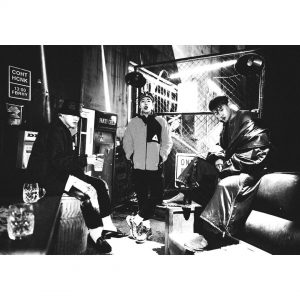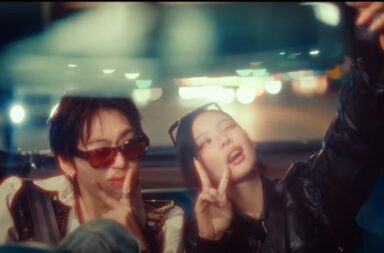 Zico, Crush, and Dean are no strangers to working together, with “Pour Up” of Dean and Zico, “what2do” of Crush and Dean, and “Oasis” of Crush and Zico, but for the first time the fanxychild members have pooled their collaborative efforts and respective styles into “Bermuda Triangle.” Though the video has no real ties to the famed Bermuda Triangle where ships and planes have reportedly gone missing, the symbol of the triangle is aptly attached to its imagery.
Zico, Crush, and Dean are no strangers to working together, with “Pour Up” of Dean and Zico, “what2do” of Crush and Dean, and “Oasis” of Crush and Zico, but for the first time the fanxychild members have pooled their collaborative efforts and respective styles into “Bermuda Triangle.” Though the video has no real ties to the famed Bermuda Triangle where ships and planes have reportedly gone missing, the symbol of the triangle is aptly attached to its imagery.
The rumors surrounding the real Bermuda Triangle have been debated and debunked over the years but there’s one thing that remains fact: strange things happen in that patch of ocean. Dean, Zico, and Crush have presented themselves as the point of this mystical triangle, in that if you try to go up against them your endeavor will surely fail. Underscoring this thought is how Dean opens and ends the song with the following lines:
Don’t let’em in let’em in
get out my zone
It’s a very obvious warning. Trying to get inside or compete with the three will end with you disappearing, or, if you want to be more literal, you won’t be able to top them. As they topped the charts after release, it’s safe to say that their boasting has merit to it. Furthermore, Dean takes it to the next step by making it seem so effortless:
Our songs are taking over the streets
This is too much of a crime to be seen as a game
There are times when artists brag about how easy it is for them to top the charts, due to popularity, fame, etc. but Dean makes the point that it’s so easy, it’s a shame for the competition. In his verses, Dean highlights the realistic view of a popular artist: getting to and being at the top requires a mentality of not letting the competition in, and if that fails, showing so much confidence that the others falter.
Dean’s parts represent a vital part of the pyramid imagery that is prevalent throughout the video in that he provides the base of the pyramid without which the other two sides cannot stand. His verses are small but vital. If you listen closely, they are done over a less grimy part of the beat. In the beginning, it serves to set the mood of the song and prepare you for the next verses. In the end of the song it brings about a sense of closure and finality.
Our next part of the triangle is Crush. Crush’s usual songs have been mellow R&B tracks, but in this case he comes hard. His voice is powerful, not the sweet lover that he’s presented so far.
Look at where you wanna lay down before you lay down
Ya’ll fakke bishes tryna act like me
I just sit and space out on my sofa but (it spills down)
Mula mula we gon pour up
Crush’s lyrics are almost self-deprecating. He talks about sitting and spacing out, an activity that he recently won a gold medal for over the summer, while on his sofa, the title of one of his earlier songs. Taken at face value, there’s only the small joke, however, there’s more to it than that. Crush is saying that he’s isn’t just some kid that sits and does nothing, though people who try to imitate may do that. It’s actually a diss, similar to Mims’s “I can sell a mill sayin nothin on da track.” Crush can do nothing and not say a word, but the money (mula mula) is still going to come (it spills down) and they’re gonna celebrate.
 With this attitude, Crush brings in the second side of our triangle. As an artist it is easy to get caught up in the lifestyle. However you have to be aware of who you are and where you’ve come from in order to not get lost. Crush uses his hobbies and his old song to remind himself of his true nature to avoid falling into the trap of selling out and becoming someone or something he’s not, a dilemma many artists face after a certain level of fame.
With this attitude, Crush brings in the second side of our triangle. As an artist it is easy to get caught up in the lifestyle. However you have to be aware of who you are and where you’ve come from in order to not get lost. Crush uses his hobbies and his old song to remind himself of his true nature to avoid falling into the trap of selling out and becoming someone or something he’s not, a dilemma many artists face after a certain level of fame.
Finally we come to the last part of our triangle: Zico. Pride is a person’s natural response when they’ve worked hard on something, especially if they’re good at it and receive continuous praise. Though pride goeth before a fall, Zico has no qualms about using his verses in “Bermuda Triangle” to not only sing his own praises, but to show unshakable confidence in his abilities.
When we’re together, even if we shut up, we get content
What happened in 1992?
Of course, flaunting is the best topic
Kids, if you’re mad, go online…
Always on the trending search, no manners when it comes to skill
Starting a fight is the goal of the reviews or interviews
It doesn’t matter what you say about Zico because you’re still talking about him. Even bad press is good press comes to mind and that’s exactly what Zico is saying. Even if you don’t like him there’s no denying that he’s talented, whether in rap or production. Those who go online to write bad reviews or just to diss him don’t mean anything. He knows they only want a response because they can’t deny his talent.
My every move is scrutinized by the public
I’m not done yet
All these controversies are only helping my resilience
I can’t hold back, I’m sso fanxy
Here is the thing about what Zico says. Though his verses tend toward boastful, he’s also very aware of the image that he’s presented and that has been painted of him. Despite it, he’s maintained a high work ethic and a resolve to keep pushing harder and doing more as though to prove that what you see only measures up so much to what you get. Zico’s side of the triangle represents an artist’s struggle with balance: what people think of you and how you got where you are versus what you know about yourself and the amount of work you’ve put into your craft.
 “Bermuda Triangle” brings together three artists to tell three sides of the same story. Though there are various locales in the video, the three main scenes correspond to three main themes. The first, of the crew meeting up and eating in alleys and on rooftops shows the beginning — in this case, the beginning of a career. The next scene, of Zico in the penthouse, bathing in the luxurious bathroom while surrounded by golden champagne bottles shows how fame can bring you the most and the best. Yet the final scenes, of all three in the church — which features one of the most famous trinities of all — shows how an artist must be grounded in something in order to carry on. The final image is that of Dean singing while the three sit with heads bowed as though in prayer before they leave, as though they needed those few moments to gather themselves to face the day. They leave in formation, Zico at the point, with Crush to his left and Dean to his right.
“Bermuda Triangle” brings together three artists to tell three sides of the same story. Though there are various locales in the video, the three main scenes correspond to three main themes. The first, of the crew meeting up and eating in alleys and on rooftops shows the beginning — in this case, the beginning of a career. The next scene, of Zico in the penthouse, bathing in the luxurious bathroom while surrounded by golden champagne bottles shows how fame can bring you the most and the best. Yet the final scenes, of all three in the church — which features one of the most famous trinities of all — shows how an artist must be grounded in something in order to carry on. The final image is that of Dean singing while the three sit with heads bowed as though in prayer before they leave, as though they needed those few moments to gather themselves to face the day. They leave in formation, Zico at the point, with Crush to his left and Dean to his right.
“What happened in 1992?” (a nod to how all three were born in the same year) is accurate to describe the song. The production and lyrics, which was done by all three participating artists is on point. The song would not be able to have the same impact if it was done individually or without one or the other members. Dean’s voice in the opening and ending are haunting, and Crush provides a welcomed relief between Zico’s verses. All in all, the fanxychild members have used their collective talent to create a hit.
Rating: 4.75/5
(KhopLoyalist, History, Vice, lyrics via Pop!gasa, MetroLyrics, YouTube [1][2][3], Images via Seven Seasons Entertainment)


